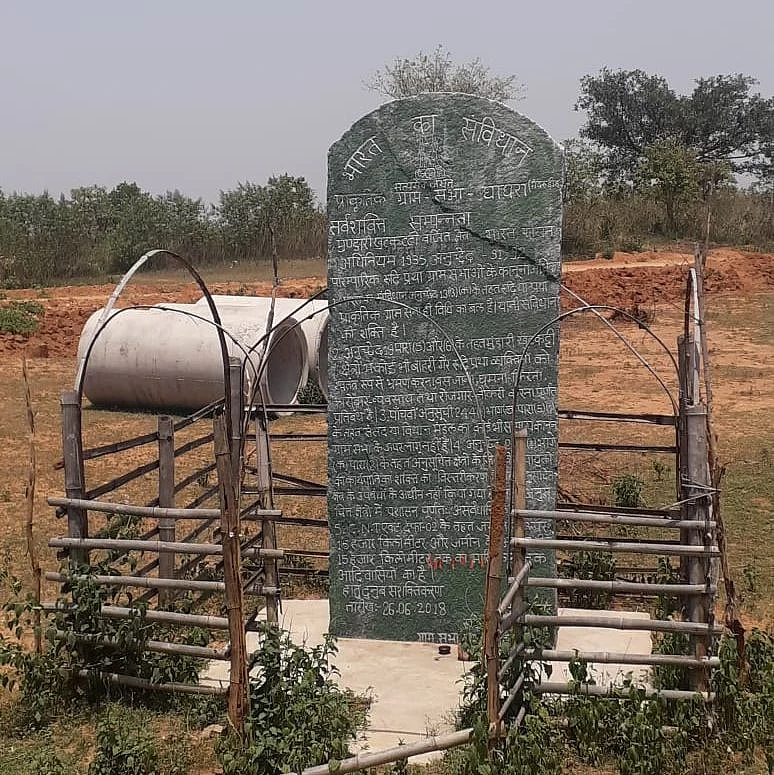Jharkhand: human rights abuses rampant in Pathalgadi villages; state looks the other way
A fact-finding team visiting Khunti district in Jharkhand found numerous human rights violations against peaceful protestors practising Pathalgadi.

A fact-finding team visiting Khunti district in Jharkhand found numerous human rights violations against peaceful protestors practising Pathalgadi.
On August 6-7, 2019, a fact-finding team comprising activists, academics, researchers and lawyers visited a few Pathalgadi villages in Khunti district (Ghaghara, Bhandra and Habuidih in Khunti block and Kochang and Birbanki in Arki block) to understand the Adivasis’ motivation for doing Pathalgadi and the response of the administration.
The team found that the state responded to Pathalgadi with severe repression and violence. Adivasis in some villages were severely beaten, houses were raided and ransacked. In Ghaghra village, a pregnant woman, Ashrita Munda, delivered a physically disabled baby, a couple of weeks after being beaten by the police during a raid. The police has also forcefully set up camps in schools and community buildings without the consent of Gram Sabhas in many Adivasi villages. In addition to this, the police has booked thousands of Adivasis under sedition. According to 15 FIRs, available with the factfinding team, the police has charged about 100-150 persons and 14,000 unnamed people under several charges including sedition. It is estimated that a total of 29 FIRs have been filed till now.
The fact-finding team found Pathalgadi to be a non-violent response to specific policies of the government; primarily its attempts to dilute land laws, failure to respect the worldview of the Adivasis, implementation of schemes without the consent of the Gram Sabha, non-implementation of PESA and provisions for the Fifth Scheduled Areas and rampant violations of human rights. The immediate trigger for Pathalgadi was the state government’s repeated attempts to amend the Chhotanagpur Tenancy Act to ease acquisition of Adivasi land. There are also apprehensions that the recently auctioned Parasi gold mines in the Tamar (Ranchi) will lead to acquisition of people’s land in Khunti for construction of roads and other infrastructure related to the mines. The people firmly said that nature (including land) is an integral part of the Adivasis’ religion and governance system. There is also anger against the constant attacks on Adivasis’ right to self-governance. While most of the interpretations of the Constitutional clauses written on the pathals may be wrong or far-fetched, they are based on valid issues and demands of Adivasis and their basic idea about the supremacy of the Gram Sabha.
Pathalgadi is a traditional practice of Munda Adivasis of erecting stone slabs (pathals) in honour of their ancestors, to announce important decisions about their families and villages or to simply mark the boundary of their villages. Since 2017, pathals painted with Constitutional provisions for Adivasis, judicial orders and their interpretations have been erected in several villages of Jharkhand.
The villagers read these provisions and orders to mean the following – 1) the supremacy of the powers of the traditional Gram Sabha and the traditional Adivasi governance systems, 2) the rights of Adivasis over land, 3) the restricted rights of non-Adivasis and other outsiders to settle down and work in Scheduled Areas, and 4) that Adivasis are the original inhabitants and owners of India.
Due to this violence, there is immense fear amongst people. According to 15 FIRs available with the fact-finding team, the police has charged about 100-150 persons and 14000 unnamed people under several charges that include abetment, obstruction to public servants while discharging their duty, creation of a public nuisance, criminal intimidation and even sedition. The villagers get scared whenever the police visits their village because any of them could be considered as one of the ‘unknown others’ in the FIRs. Many people named in the FIRs or picked up by police were not even aware of the charges against them.
The police has set up camps in schools and community buildings without the consent of Gram Sabhas in many Adivasi villages. The team found that government schools in Kochang and Kurunga were merged with faraway schools, as their building was converted into police camps. People of Kochang shared that the local administration even forged a resolution of their Gram Sabha to show consent to the acquisition of some land for setting up a permanent police camp in the village.
The harkhand Janadhikar Mahasabha made the following requests to the Chief Secretary:
• The government must immediately withdraw all FIRs and charges of sedition on the thousands of unnamed residents of Khunti and activists. It must also undertake judicial inquiry into the charges framed against the named people in the FIRs within a stipulated timeframe. It must make public all the evidence that formed the basis for these FIRs and the evidence collected in all related inquiries since then.
• The government should undertake judicial inquiry into the human rights violations by security forces in Ghaghra and other villages and ensure punitive action against responsible personnel. It must also ensure compensation to victims of police atrocities in these villages.
• The government must remove all police camps from the nine schools and two community buildings in Adrki, Kochang, Kurunga Birbanki, Kitahatu, Kewra and Hut.
• The government should initiate genuine dialogue with representatives of the Pathalgadi villages, Adivasi organisations and experts on the interpretation of Constitutional provisions written on the pathals.
• The government must ensure strict and immediate implementation of all provisions for the Fifth Scheduled Areas and PESA.
Several organisations such as Adivasi Adhikar Manch, AIPWA, HRLN, Jharkhand Munda Sabha and WSS participated in it. The fact-finding inquiry was facilitated by Jharkhand Janadhikar Mahasabha (JJM), a network of several people’s organisations and activists.
Follow us on: Facebook, Twitter, Google News, Instagram
Join our official telegram channel (@nationalherald) and stay updated with the latest headlines
